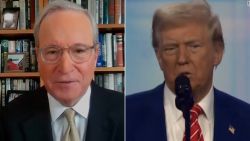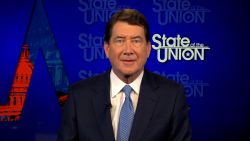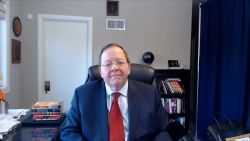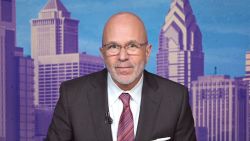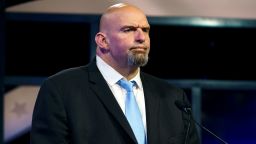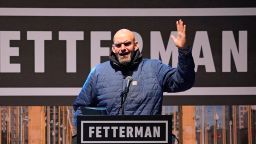Late twists are rocking the tight Senate races that will decide the destiny of a chamber now narrowly run by Democrats – as well as the future direction of America itself – on Election Day in just 12 days.
The Democrats’ best chance of snatching a Senate seat held by Republicans may have been further complicated by John Fetterman’s shaky debate performance in Pennsylvania Tuesday night, which raised more questions about the stroke survivor’s fitness to serve.
That same question – albeit from different circumstances – is again swirling around Georgia Republican Senate nominee Herschel Walker after an unnamed woman claimed at a press conference Wednesday that he pressured her to have an abortion in 1993. The college football icon branded the accusation “a lie,” but after facing similar accusations by a former girlfriend, it’s opened him up to more charges of hypocrisy since he has before called for a national ban on abortion with no exceptions.
More on key Senate races
Meanwhile in Arizona, where the Republican Party’s march to its anti-democratic fringe is gathering steam, Senate nominee Blake Masters was shown on camera vowing to ex-President Donald Trump that he would not go “soft” on false voter fraud claims. Separately, Masters on Tuesday told supporters it was fine for them to film drop boxes to prevent “ballot harvesting” amid a controversy over “vigilante groups” allegedly conspiring to intimidate voters using the early balloting boxes.

The volatile state of all three races – each of which could be pivotal to determining Senate control – underscores the huge stakes going into the election. It explains the intensifying fight between the parties and an increasingly nasty tone that is rattling debate stages across the country. And it comes as Democrats desperately seek to stop Republican momentum in the campaign, which is rooted in voter frustration about raging inflation and high gas prices coming out of the pandemic.
President Joe Biden’s approval ratings have been driven down to levels that could prove disastrous for Democratic candidates. GOP attack ads are also creating a dystopian vision of a nation stalked by violent crime, while Democrats are hitting Republicans over their anti-abortion positions, following the Supreme Court’s overturning of Roe v. Wade in June.
If Republicans win the Senate – in a year in which they are favorites to win back the House – they will be able to blitz the White House with investigations and crimp Biden’s presidency. They will also be able to halt the White House’s efforts to balance out Republican success in reshaping the judiciary on deeply conservative lines.
Fetterman’s debate struggles vex Democrats in critical race
Pennsylvania, which is critical to Democratic hopes of holding their majority in the 50-50 chamber, could end up being the most important Senate race in the country. Republicans only need a net gain of one seat to win the majority, so winning the Keystone State could help Democrats mitigate losses in other states where they’re on defense.
Even after suffering a stroke in May, Fetterman had the momentum for much of the summer over celebrity surgeon Mehmet Oz. But the race has tightened in recent days. The Democrat’s struggle to articulate his positions and deliver attacks on his rival in Tuesday night’s debate caused reverberations of concern in Washington.
Fetterman had warned that he is still dealing with auditory and linguistic after-effects from his stroke but his struggle at times to find the right words on the debate stage was painful to watch. Several times, he seemed to lose his train of thought and repeated phrases. “To be honest, doing that debate wasn’t exactly easy,” Fetterman told supporters at a rally Wednesday night.
The question now is whether undecided voters will wonder whether he is well enough to go to the Senate – even if his doctors say that he is getting better all the time. It’s possible partisan lines are so cemented by this point that his performance will not matter. Still, more than 600,000 Pennsylvanians have already cast votes in the race and Fetterman’s debate showing – effectively a job interview – came at a moment when voters are making up their minds all the time, more than a week from Election Day. If he loses, his campaign will face questions over whether he erred in agreeing to debate Oz.
Former Republican Rep. Charlie Dent of Pennsylvania said Fetterman’s campaign had set the bar at a very low level, but not low enough for a debate that he called “disturbing on many levels.”
“That was really an awful thing to watch. On a human level, I feel for John Fetterman,” Dent told CNN’s Wolf Blitzer on “The Situation Room” on Wednesday. “It just struck me that he is not ready. … I think it’s going to have an enormous impact on the race.”
Still, Fetterman may win points for courage in not allowing his health to interfere with his political fight for Pennsylvanians. At his campaign events, he asks supporters whether they or their relatives have suffered a health crisis, and promises to go to Washington to secure for them the health care that he says saved his life.
In multiple conversations with voters, CNN’s Jeff Zeleny picked up anxiety among Fetterman’s supporters about how his stumbles could hurt his chances, even if they weren’t personally backing away from him.
But one Fetterman backer, Craig Bischof, in the central town of Bedford, said his candidate “gets healthier every day” and had “come a long way.”
One woman, however, in the Republican-leaning town, Jan Welsch, said the Democrat’s performance was “embarrassing” and that Pennsylvania would be in deep trouble if it voted for him.
But such comments also raise the question of how much Fetterman’s ongoing recovery would really affect his job in the Senate – a chamber known to have its fair share of elderly and ailing lawmakers. Plus, it’s not as if a single senator has the power of a president, for example, who has to make and explain critical national security decisions. Then there is also the question of whether Fetterman is being unfairly treated for what is, in essence at this stage, a disability, in a discriminatory way that may not be tolerated in another workplace.
But Fetterman badly needs to change the subject. Oz gave him some material to work with on Tuesday night, and the Fetterman campaign quickly released an attack ad based on the Republican’s comment that “local political leaders” should have a say, alongside women and doctors, on whether someone should get an abortion. The gaffe played directly into Democratic efforts to portray Oz and his fellow Republicans as too extreme for crucial suburban voters.
New allegations hit Georgia GOP candidate Walker
While Pennsylvanians were digesting the debate, voters in Georgia – thousands of whom have been flocking to polling places to cast early ballots – learned of a new alleged scandal hitting Walker, who was hand-picked by Trump and is trying to unseat Democratic Sen. Raphael Warnock.
A unnamed woman who claimed she was in a yearslong romantic relationship with Walker said the Senate nominee pressured her into having an abortion in 1993. The woman, referred to as Jane Doe to protect her identity, attended the press conference virtually with her lawyer, Gloria Allred, and read her statement. Her voice was heard, but her face was not shown.
“He has publicly taken the position that he is about life and against abortion under any circumstance when in fact he pressured me to have an abortion and personally ensured that it occurred by driving me to the clinic and paying for it,” Doe said, accusing Walker of hypocrisy.
Allred on Wednesday provided evidence corroborating an alleged relationship between Doe and Walker, but she did not provide any details corroborating the abortion claim.
The GOP nominee accused Democrats of orchestrating the attack.
“I already told people this is a lie, and I’m not going to entertain, continue to carry a lie along. And I also want to let you know that I didn’t kill JFK either,” Walker said at a campaign event prior to the press conference. “I’m done with all this foolishness,” he added in a statement Wednesday evening.
Walker has already been accused by a former girlfriend of encouraging her to have an abortion and then reimbursing her for the cost. He has denounced that claim as a “flat-out lie.” But presented with a copy of the check the first woman said was a payment for her procedure, he conceded it was his signature on the paper, although he said he did not know what the check was for. CNN has not independently confirmed the first woman’s allegations. She has remained anonymous in public reports.
The political impact of the latest claim was not clear. It could damage Walker, who is running significantly behind popular Republican Gov. Brian Kemp, who’s running for reelection in a rematch against Democrat Stacey Abrams. But national Republicans keep coming to rally around Walker, with Texas Sen. Ted Cruz hitting the trail with him on Thursday.
The abortion issue is hardly likely to help Walker in key suburbs and might dampen support among religious conservatives. But polling in the wake of the initial allegations against him showed his position in the race little changed, narrowly trailing Warnock. And Walker’s political mentor, Trump, showed in his bargain with social conservatives that a scandal-plagued private life need not be politically disqualifying. The former President repaid their faith in him by going on to construct a conservative Supreme Court majority. Politics may have reached a point of such polarization in the US that ideology, rather than the personality of the candidate, could be the driving force in some elections.

Democracy on the ballot in Arizona
Trump’s influence is weighing on Arizona, where Masters is locked in a close race with Democratic Sen. Mark Kelly.
In a phone call captured in a Fox documentary, the former President is shown rebuking Masters after he said in a debate that he hadn’t seen evidence of election fraud in Arizona.
“If you want to get across the line, you’ve got to go stronger on that one thing. That was the one thing, a lot of complaints about it,” Trump told Masters, using Arizona Republican gubernatorial nominee Kari Lake as an example.
“Look at Kari. Kari’s winning with very little money. And if they say, ‘How is your family?’ she says the election was rigged and stolen. You’ll lose if you go soft. You’re going to lose that base,” Trump said.
Masters was shown telling Trump: “I’m not going soft.”
Arizona has become a hotbed of election denialism in the wake of Trump’s 2020 loss in the state – which is reflected in the slate of Trump-backed candidates running up and down the ballot there. The elevation of such conspiracy theories has led to restrictive new voting laws across the country and fears about voter intimidation efforts.
The Arizona chapter of the League of Women Voters, for example, filed a lawsuit in federal court late Tuesday targeting groups and individuals that they say are conspiring to intimidate voters through a coordinated effort known as “Operation Drop Box.”
This is the second recent lawsuit filed in federal court targeting the conduct of individuals – some of whom are armed – who have been staking out and filming voters at ballot drop boxes in Arizona.
Masters told KTAR News on Tuesday that it was alright for people to watch ballot boxes but that they should comply with the law.
“If you are planning on watching the ballot boxes, stay whatever distance away, don’t intimidate voters, get your video camera out and record to make sure people aren’t ballot harvesting,” Masters said.









